How an Apache pro skater and Tony Hawk's foundation are bringing a skate park to Arizona
When one of the most famous people in your chosen field comes calling with support, you know that your hard work and dedication have finally borne fruit.
That’s how Douglas Miles Jr. felt recently when he got the news that legendary pro skateboarder Tony Hawk's foundation, the Skatepark Project, will help fund Miles Jr.’s long-held vision of a professional-quality skate park in his community of Whiteriver on the Fort Apache Indian Reservation in eastern Arizona.
“We post all the time on social media and we’re active on it,” said Miles Jr., 33, a professional skateboarder and filmmaker. “We just show us skating, that's what skaters do, is film their tricks and it’s fun.
“So when the Skatepark Project saw us, they were like, ‘OK, they're putting in work and this is a worthy project.’ I talked to the director (of the Skatepark Project) and he said, ‘Yeah, you guys are next.’”
Dreaming big: This Apache pro skater wants to bring a skate park to his town
'We're going to get the skate park'
Hawk founded the Skatepark Project in 2002, originally called the Tony Hawk Foundation, to help build safe and quality spaces for skaters, who often felt shunned in their own communities or other places they would skate.
The nonprofit has awarded over $10 million to more than 600 public skate park projects in all 50 states. So far, 575 grant recipients have opened their skateparks.
The money promised to Miles Jr.'s project, which is expected to be between $50,000 and around $300,000 depending on the final scope of the project, will transform Whiteriver’s current park from a collection of homemade obstacles into a world-class location.
For Miles Jr., it’s all about meeting the moment and paying it forward to his people. Years of hard work, coupled with passion and grassroots outreach, have brought him recognition and support from his Apache community, around the country and even overseas.
At the same time, skateboarding has emerged over the last two decades from a sport on the fringes of society to the big stage, with professional tours, large sponsorship money and skaters competing for medals at the Olympics.
“I'm stoked,” Miles Jr. said with a big smile on his face. “We are going to do it. We're going to get the skatepark. That's all we wanted. That's all we wanted to do.”
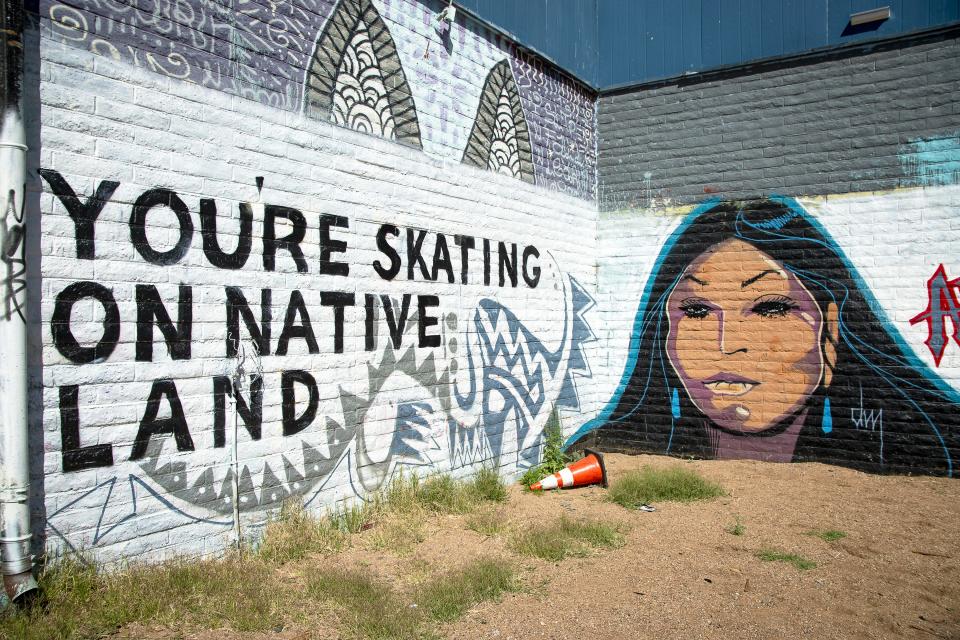
Why tiny Whiteriver, Arizona, needs a skatepark
It started, as it often does in the skating community, with kids wanting to have fun and a DIY attitude. That’s how Miles Jr. learned how to skate.
When he first picked up the sport in the seventh grade, after seeing his friends skate on the streets of his hometown of San Carlos on the San Carlos Reservation east of Globe, there were few facilities for skating.
There was a much bigger emphasis on team sports like baseball and basketball.
“Basketball is big on the rez,” Miles Jr. said. “In every community there's like one or two basketball courts, but that's it, really.”
But this didn’t hinder Miles Jr. and his friends. They created their own skating obstacles, known in the skateboarding world as DIY parks.
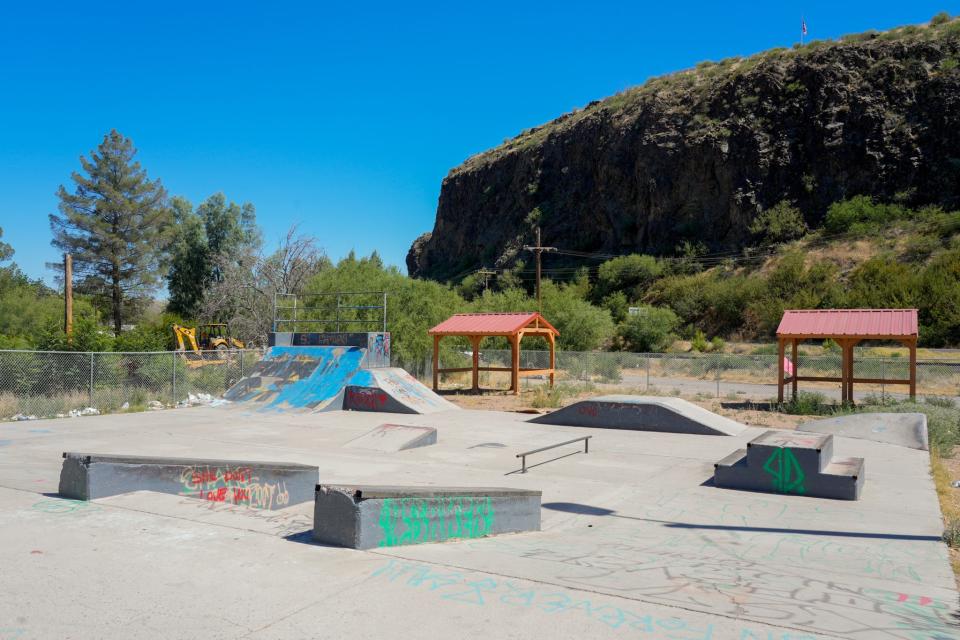
These unofficial facilities exist on swaths of abandoned or unused concrete on streets, under bridges, or in abandoned or unused lots. They are built by the skaters themselves, over time with whatever materials are available at the moment.
“Growing up, we would skate at school parking lots or at the post office, the store down the street, basketball courts and the old San Carlos skatepark that you saw wasn’t very good.”
That changed three years ago when San Carlos Chairman Terry Rambler decided to pursue the idea of building a proper skating facility.
Miles Jr. and his father, Douglas Miles Sr., a noted artist, photographer and Indigenous activist, provided expertise on what should be included in the park. They also spearheaded community outreach to raise awareness.
“Our job was to come in, let them know this is how skateboarding is,” Miles Jr. said. “We had connections with some designers and some builders, so we were able to work with the council and the community of skaters here.”
The San Carlos skatepark opened on April 1, 2022.
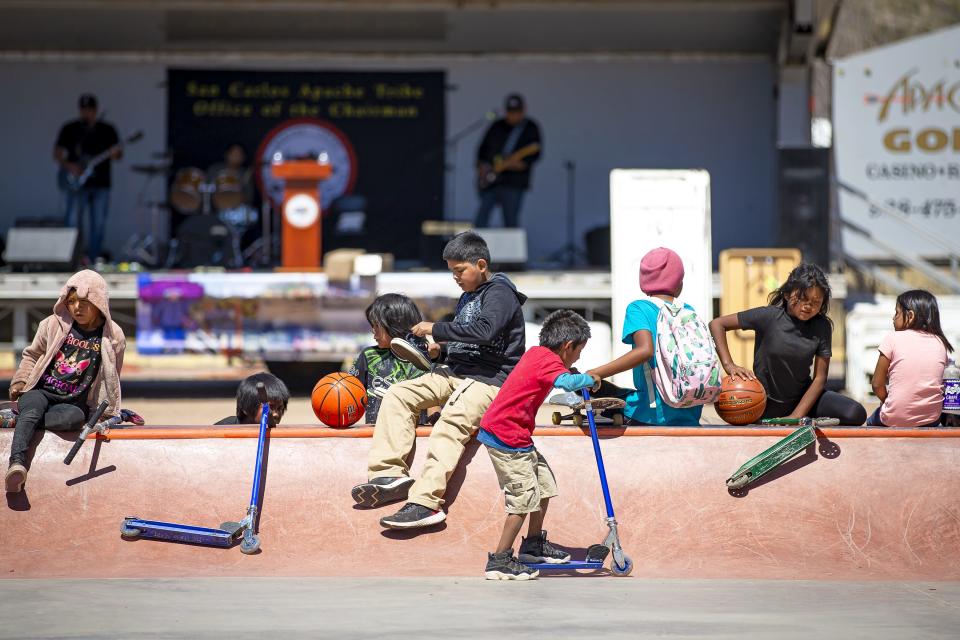
The $200,000 park, funded by the San Carlos tribal council, sits on what was previously an abandoned jail and courthouse. It is part of a larger sports complex that boasts basketball courts and, soon, a bike path and softball fields.
“I think this has an extremely positive impact, putting a 21st-century skatepark in the middle of what was once an old jail, a symbol of incarceration and the police state, so to speak, for Native kids,” Miles Sr. said.
“It's important for them to see that their community can grow, that community can change, that if you come together and work, your community can actually be transformed right before your eyes. And I think that's what the skatepark really represents.”
How Miles Jr. got support from his community
When Miles Jr. moved to his wife’s hometown of Whiteriver in 2019, he found a similar situation. Many young skateboarders there were riding on the foundation of an unbuilt house.
Miles set out to raise money and gain community support for a better park in Whiteriver. Unlike in San Carlos, however, he found little enthusiasm from the White Mountain Apache tribal council, which didn’t see value in spending money on skateboarding when there were more pressing priorities.
Forced to go it alone, Miles Jr. created a GoFundMe page in November 2020 for his Apache Passion Project, despite having no fundraising experience. He set a modest goal of raising $3,000 to build new skate ramps at the DIY park.
For more stories that matter, subscribe to azcentral.com.
Miles Jr. adeptly used social media to focus attention on Apache skateboarding culture and his GoFundMe page. Word spread through skating communities across the country and donations came pouring in. Miles Jr. has raised over $53,000 from more than 400 donors to date.
While he was fundraising, Miles Jr. was able to get the support of Gwendena Lee-Gatewood, the chairwoman of the White Mountain Apache Tribe at the time.
Her support came as Whiteriver was in the throes of the pandemic, which kept people at home with little opportunity for exercise and outdoor activity. Lee-Gatewood saw the enthusiasm of the local skaters for their sport and for Miles Jr.'s project and knew it was time to act.
“The pandemic really taught us the value of time, the value of family, the value of getting together,” Lee-Gatewood said. “The skatepark was just something that we really needed to do.
"There was already a new baseball field for the tribe. There's already indoor basketball courts for the tribe. There's rodeo arenas for all the other kids. But skateboarding, these kids, all they had was a cement foundation and they made it work.
“The kids did their part. They advocated, their parents advocated, their community advocated. And we saw how resilient these children are, that in the face of adversity, it didn't stop them from doing what they love.”
How Whiteriver teamed up with the Skatepark Project
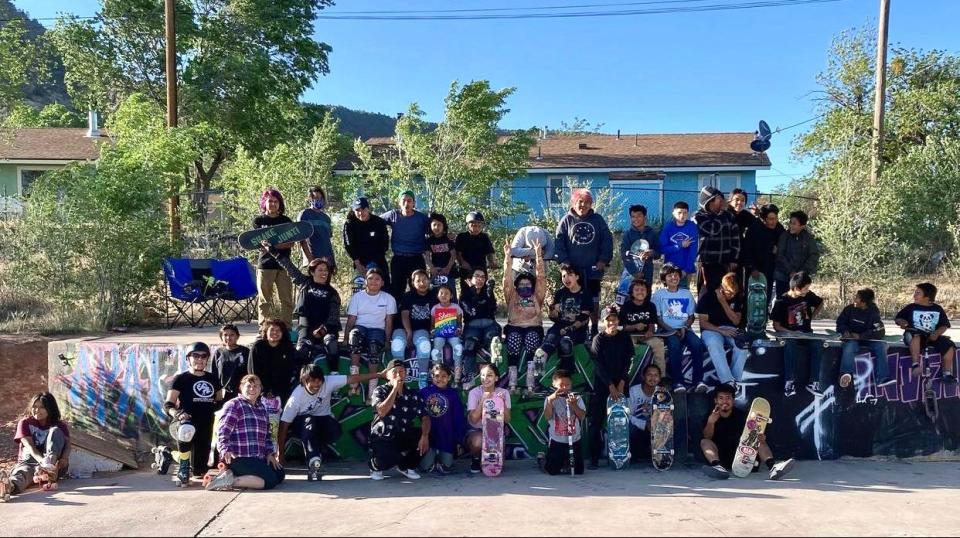
With Lee-Gatewood's backing, the tribal council created a committee that included Miles Jr., his father, tribal members and government partners to see the project through. The committee applied for grants, procured the land and hired a team to design and build a skatepark.
Lisa Jelliffe, committee member and senior strategist at Amaktoolik Studios, an architecture and planning firm that has worked with the White Mountain Apache Tribe since 2018, was in charge of identifying sources of funding.
She reached out to the Skatepark Project in the fall of 2021 at the recommendation of Lee-Gatewood.
“We got everybody pooled together and got everything organized so that we had a clear directive of our goals, which were to get some funding and find the spot for a new skate park,” Jelliffe said. “We wanted to meet all protocols and approvals to get it moving.”
The committee put together a letter of inquiry, legal documentation on where the park would be, press clippings that showed community support for the park, a proposed design and proof of resolution to show that the tribe approved the project.
“We wanted to demonstrate in this package how much of a big deal this was for this community, and that they are having to (skate) in kind of unfortunate settings and these kids are worthy of something better, something they can be proud of and something that is theirs,” Jelliffe said.
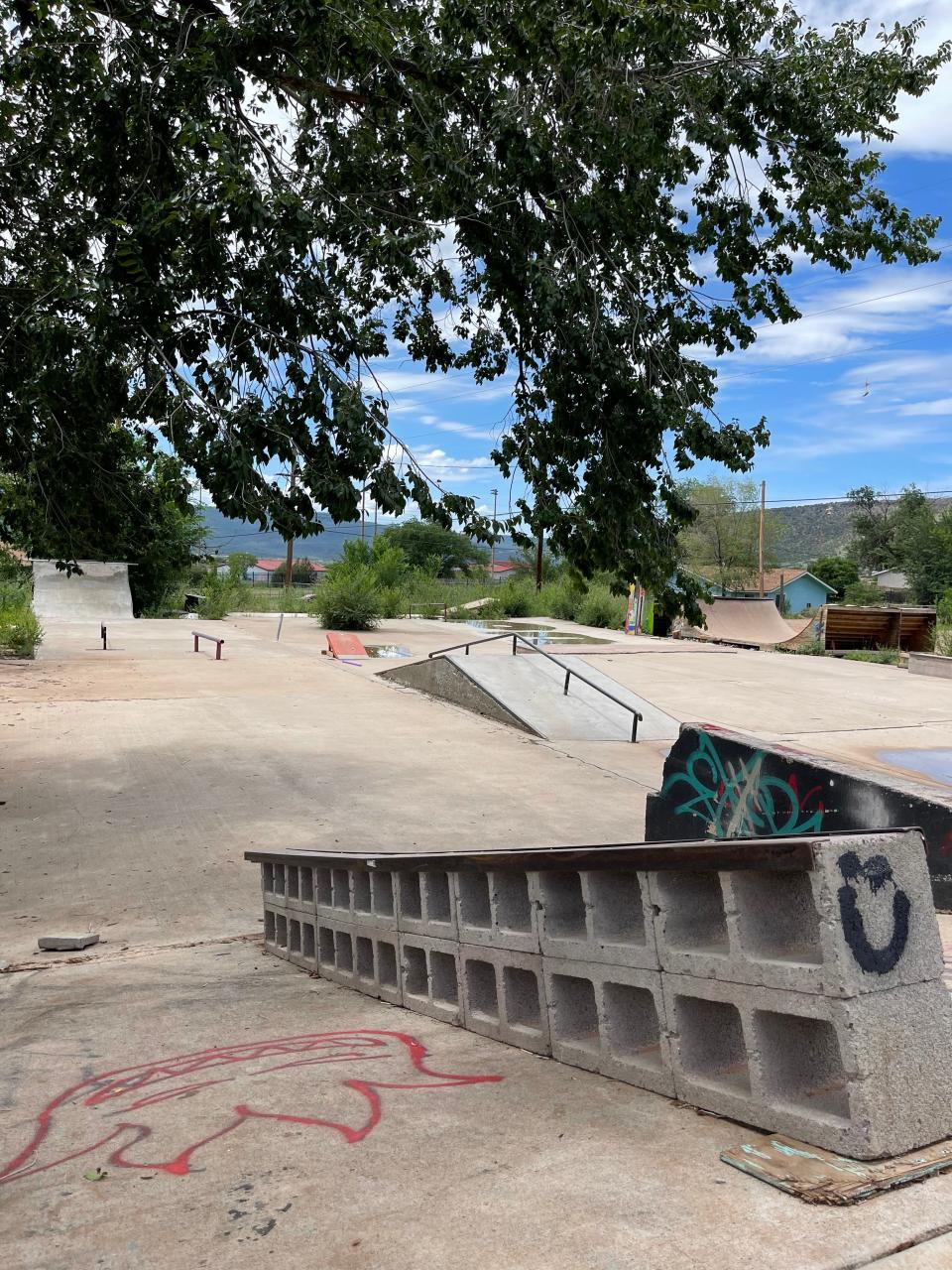
What's next for the project
Colbert Burnette, who is the tribal engineer for the White Mountain Apache Tribe and works for the planning department, says the new administration is pushing forward with efforts to build the skatepark.
On Aug. 25, the council, committee and Miles Jr. will host a community workshop in Whiteriver where the skaters who will use the skatepark can contribute their ideas for how they want it to look.
“We are kind of in awe of the network Doug is affiliated with and they're all good," Burnette said.
"He's the kind of citizen that any small town would want. He resonates with just wanting to get something good for the kids. So in that sense, I've been drawn to try to make every effort to try to donate my time.”
'The community is really behind this'
The Skatepark Project agreed that Whiteriver needs a park. The final scope of the project is being determined and the funding amount is expected to be finalized in the fall.
“The community is really behind this Whiteriver project, and there's just so much enthusiasm from local leaders, and we're excited to make this happen with them as soon as possible,” said Benjamin Bashein, executive director of the Skatepark Project. “We hope they will be scaling it by this time next year.”
Despite the project growing and taking on additional stakeholders, the driving force remains Miles Jr. He is putting together a preliminary design, organizing skate events and workshops and promoting Apache skate culture on social media.
With the money Miles Jr. raised from his GoFundMe, he and the skaters of Whiteriver are improving the structures on their current spot and building more DIY skate parks on empty foundations and abandoned basketball courts across the reservation. Ramps and obstacles are being built in Cibecue, nearly 50 miles from Whiteriver, which has no skatepark.
'His passion is contagious'

Miles Jr.'s work and laser-like dedication to the project haven’t gone unnoticed.
“I would not have wanted to stay as intimately involved if Douglas Junior had not been a part of this,” Jelliffe said. “His passion is contagious. He is an incredible person and an incredible leader.
“He motivates people. He doesn't sit around and wait for things to come. He goes out and he seeks it. But he is also very modest. I definitely think there's no way that the Skatepark Project people would be as engaged with the project had it not been for Douglas Jr. He’s literally like a rock star.”
For The Skatepark Project, Miles Jr.’s passion and efforts are exactly what they seek when choosing projects to back.
“It's important to see that local folks kind of have invested personally in the space,” Bashein said. “You know that it's something that they're going to cherish and respect and help to steward after a really long time.
“That ethos is so essential to skateboarding. For a long time, communities and municipalities maybe didn't recognize the value of the skatepark. So it really took folks like Douglas rolling up their sleeves and leading the effort themselves.”
Miles Sr., who has watched his son's passion and commitment from the beginning also couldn't help but feel proud of his son's work.
“What Doug is really doing is youth development and youth support,” Miles Sr. said. “He's built up community support in the Apache community. He’s worked hands-on with kids, skating with them, doing skate workshops and of course, he's fundraising.
"He's also created awareness online and he's gotten the attention of brands and companies and nonprofits and caused them to look at these communities.”
Soon after Miles Jr. received word from the Skatepark Project that a Whiteriver park would be funded, he paid a visit to his hometown of San Carlos. He took a few spins at the shiny new skatepark, then sat on one of the obstacles and reflected on all the hard work and the payoff it created.
His thoughts, as they have been since he began this journey three years ago, were all about his people and the benefits they would soon enjoy.
“It felt a little bit unreal to me,” Miles Jr. said of the San Carlos park. “Like, wow, there's a skatepark and a really good one, too. Sometimes I'll sit back and look at these kids and think, 'Wow, this is cool.' I will soak it all in for a little bit and get back to skating.
"We could do this too for Whiteriver. This is a good thing for this community, for our people.”
You can connect with Arizona Republic Culture and Outdoors Reporter Shanti Lerner through email at shanti.lerner@gannett.com or you can also follow her on Twitter.
Support local journalism like this story by subscribing today.
This article originally appeared on Arizona Republic: Tony Hawk's Skatepark Project to build on Apache reservation

